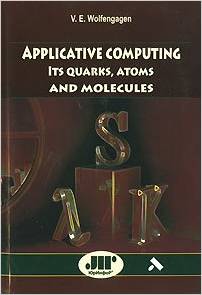
|
FreeComputerBooks.com
Links to Free Computer, Mathematics, Technical Books all over the World
|
|
- Title Applicative Computing: Its Quarks, Atoms and Molecules
- Authors V. E. Wolfengage
- Publisher: JurInfoR; eBook (Creative Commons Licensed)
- License(s): Creative Commons License (CC)
- Hardcover: 672 pages
- eBook: HTML, PDF (5.1 MB), ePub, Kindle, Daisy, DjVu, etc.
- Language: English
- ISBN-10: 5891581779
- ISBN-13: 978-5891581777
- Share This:

|
Applicative computing systems, or ACS are the systems of object calculi founded on combinatory logic and lambda calculus.[1] The only essential notion which is under consideration in these systems is the representation of object. In combinatory logic the only metaoperator is application in a sense of applying one object to other. In lambda calculus two metaoperators are used: application - the same as in combinatory logic, and functional abstraction which binds the only variable in one object.
This work covers the advanced topics in main ideas of computing in general. This material is approved in practice of NRNU MEPhI, MIPT and several other educational centers of the Russian Federation.
Its 1st part represents an outlook of computations, which is achieved by adoption of the atomic doctrine for specified reference system of primary objects. The main attention is given to finding-out of technological features of computations with objects. Their interaction is considered in applicative environment that allows finding out internal structure of usual operations which knowledge allows understanding their properties. The choice of initial constant entities, considered as primary and referred as combinators is discussed. These initial entities are used as the basic `building blocks', entering in applicative environment in interaction with each other. This interaction results in the constructs, giving representative sets of usual operators and to the embedded computing systems.
The 2nd part gives some supply of environments for educational and methodical complex of corresponding discipline (EMCD). This material is suitable both for advanced learners and beginners in Computing and Information Technologies as well as in Discrete Mathematics (DM) and Fundamental Basics of Information Technologies (FBIT). It helps for developing the intuition sufficient for successful navigation across the dramatically changing world of innovative information processes which occurs both in nature and technology. Material is especially useful for the instructor, postgraduate and graduate students of IT-specialties and is suitable for the system of training and advancing the qualification of specialists.
About the Authors- N/A
- Theory of Computation and Computing
- Computational Complexity
- Mathematical Logic - Set Theory, Model Theory, Computability, etc
- Introduction to Computer Science
 Similar Books:
Similar Books:
-
 Applicative Computing (Jimmy Or)
Applicative Computing (Jimmy Or)
This book provides an overview of state of the art research in Affective Computing. It presents new ideas, original results and practical experiences in this increasingly important research field.
-
 Towards a Self-Replicating Turing Machine (Ralph P. Lano)
Towards a Self-Replicating Turing Machine (Ralph P. Lano)
In this book partial implementations of Von Neumann's Universal Constructor and universal copier are provided. Combining different technologies, we arrive at a proposal for a self-replicating Turing machine.
-
 Theory of Computation, Making Connections (Jim Hefferon)
Theory of Computation, Making Connections (Jim Hefferon)
The book is geared toward those who thirst for computation theory knowledge. To cater to the demands of a wide range of people, the principles in this book are explained in a way that is easy to understand, digest and apply in the upcoming career.
-
 Models of Computation: Exploring the Power of Computing
Models of Computation: Exploring the Power of Computing
It covers the traditional topics of formal languages, automata and complexity classes, as well as an introduction to the more modern topics of space-time tradeoffs, memory hierarchies, parallel computation, the VLSI model, and circuit complexity.
-
 Automata Theory: An Algorithmic Approach (Javier Esparza, et al)
Automata Theory: An Algorithmic Approach (Javier Esparza, et al)
This textbook presents Automata Theory from a fresh viewpoint inspired by its main modern application, program verification, where automata are viewed as data structures for the algorithmic manipulation of sets and relations.
-
 Foundations of Computation (Carol Critchlow, et al)
Foundations of Computation (Carol Critchlow, et al)
It includes topics from discrete mathematics, automata theory, formal language theory, and the theory of computation, along with practical applications to computer science. The course has no prerequisites other than introductory computer programming.
-
 Delftse Foundations of Computation (Stefan Hugtenburg, et al)
Delftse Foundations of Computation (Stefan Hugtenburg, et al)
Topics from propositional and predicate logic, proof techniques, set theory and the theory of computation, along with practical applications to computer science. It has no prerequisites other than a general familiarity with computer programming.
-
 A Data-Centric Introduction to Computing (Kathi Fisler, et al)
A Data-Centric Introduction to Computing (Kathi Fisler, et al)
This book is an introduction to computer science. It will teach you to program, and do so in ways that are of practical value and importance. It uses a data-centric approach: data centric = data science + data structures.
-
 Introduction to Classical and Quantum Computing (Tom Wong)
Introduction to Classical and Quantum Computing (Tom Wong)
This book is for students who want to learn quantum computing beyond a conceptual level, but who lack advanced training in mathematics. The only prerequisite is trigonometry, and mathematics beyond that will be covered.





